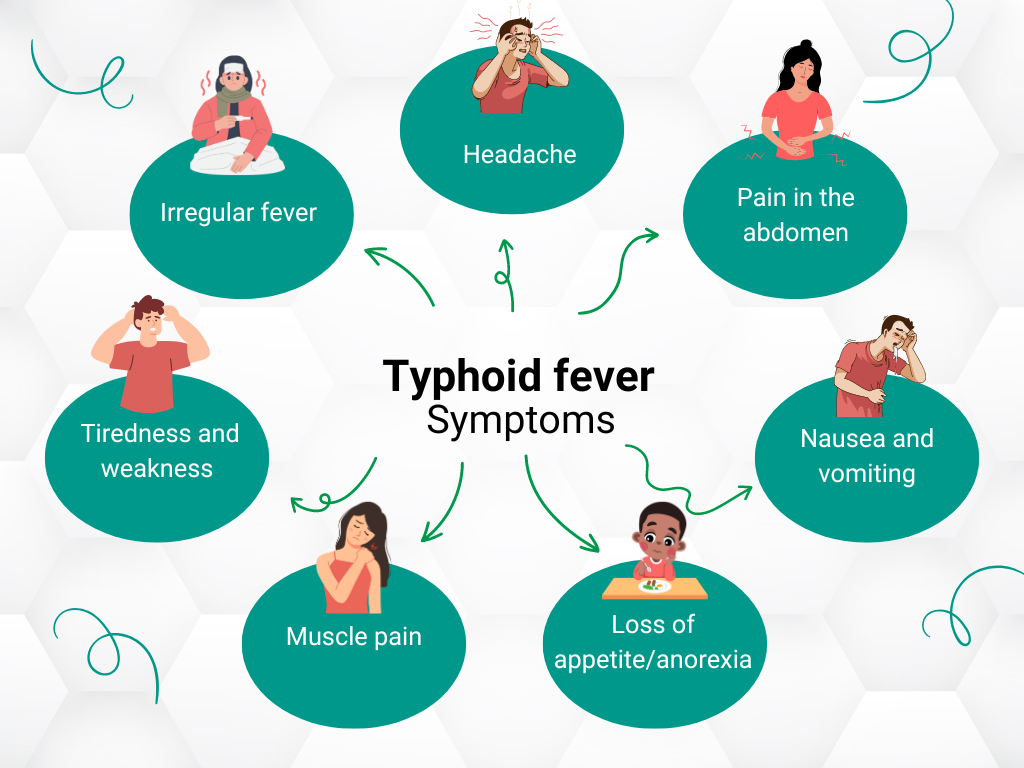Typhoid fever is a serious bacterial infection caused by Salmonella typhi, a pathogen that spreads through contaminated food and water. This illness remains a significant concern, particularly in regions with inadequate sanitation. In this comprehensive guide, we’ll delve into the key aspects of typhoid fever, including its symptoms, causes, and effective treatment options.

What is Typhoid Fever?
Typhoid fever is a systemic infection that can lead to severe complications if left untreated. It is transmitted primarily through:
- Contaminated Food and Water: The bacteria Salmonella typhi are commonly found in food or water that has been tainted by fecal matter from an infected person. Consuming such contaminated items can lead to infection.
- Poor Hygiene and Sanitation: Areas with inadequate sanitation practices and poor hygiene are at a higher risk for typhoid outbreaks. Ensuring proper sanitation is crucial to controlling the spread of this disease.
Symptoms of Typhoid Fever
Recognizing the symptoms of typhoid fever is crucial for early diagnosis and treatment. Symptoms typically appear 1-3 weeks after exposure and may include:
- High Fever: A sustained fever that gradually rises and can reach up to 104°F (40°C). This is one of the hallmark signs of the infection.
- Weakness and Fatigue: Persistent feelings of weakness and exhaustion that can significantly impact daily activities.
- Abdominal Pain: Discomfort or pain in the abdomen, which may be accompanied by bloating and tenderness.
- Headache: Severe and persistent headaches that may worsen over time.
- Loss of Appetite: A marked reduction in appetite, which can lead to unintended weight loss.
- Rash: In some cases, a rash of flat, rose-colored spots may develop on the abdomen. This rash is not present in all cases but can be indicative of typhoid fever.

Diagnosis of Typhoid Fever
Accurate diagnosis is essential for effective treatment. Diagnostic methods include:
- Medical History and Examination: A thorough review of the patient’s medical history and a physical examination are crucial. This helps in identifying potential exposure risks and assessing symptoms.
- Laboratory Tests: Blood, stool, or urine tests are conducted to confirm the presence of Salmonella typhi bacteria. Blood cultures are often used to identify the bacteria, while stool and urine tests can provide additional confirmation.

Treatment for Typhoid Fever
Timely treatment is vital to manage typhoid fever effectively. Treatment typically involves:
- Antibiotics: A course of antibiotics is prescribed to combat the infection. Commonly used antibiotics include ciprofloxacin, azithromycin, and ceftriaxone. It’s important to complete the full course of antibiotics to ensure the bacteria are fully eradicated.
- Hydration: Maintaining adequate hydration is crucial, especially if the patient experiences fever, diarrhea, or vomiting. Oral rehydration solutions can help replenish lost fluids and electrolytes.
- Rest: Sufficient rest is essential to support the body’s recovery process. Rest helps the immune system fight off the infection and aids in overall recovery.
Preventing Typhoid Fever
Preventative measures are key to reducing the incidence of typhoid fever. Strategies include:
- Enhanced Sanitation: Ensuring access to clean water and well-maintained sanitation facilities is critical in preventing the spread of typhoid fever. Proper waste disposal and hygiene practices play a significant role in reducing the risk.
- Safe Food and Water Practices: Consuming properly cooked food and avoiding unclean or potentially contaminated water can prevent infection. Always ensure that food is cooked thoroughly and water is purified before consumption.
- Vaccination: Typhoid vaccines are available and recommended for individuals traveling to or living in areas where typhoid fever is common. The vaccine helps protect against the disease and reduces the risk of infection.
Conclusion
Typhoid fever is a preventable and treatable disease, but it requires awareness, proper sanitation, and timely medical intervention. At Dekh Bhal Healthcare, we are committed to educating our community about such infections and providing comprehensive healthcare services. For more information or assistance with typhoid prevention and treatment, visit our website.
For further reading on related topics, check out: